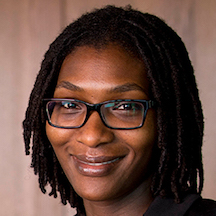 A new study led by Sheretta Butler-Barnes, an assistant professor of social work at Washington University in St. Louis, finds that young African American women with strong racial identity are more likely to be academically curious and persistent in school.
A new study led by Sheretta Butler-Barnes, an assistant professor of social work at Washington University in St. Louis, finds that young African American women with strong racial identity are more likely to be academically curious and persistent in school.
Researchers surveyed 733 adolescent Black girls from middle and high schools across three socio-economically diverse school districts in the Midwest. The study found that racial identity and positive perceptions of school climate were associated with greater academic motivation. Moreover, the researchers learned that racial identity acted as a protective factor in hostile or negative school climates.
“Persons of color who have unhealthy racial identity beliefs tend to perform lower in school and have more symptoms of depression,” Dr. Butler-Barnes said. “In our study, we found that feeling positive about being Black, and feeling support and belonging at school may be especially important for African-American girls’ classroom engagement and curiosity. Feeling connected to the school may also work together with racial identity attitudes to improve academic outcomes.”
Dr. Butler-Barnes joined the Brown School in July 2012 as an assistant professor. Before coming to the Brown School, Butler-Barnes was a National Science Foundation Postdoctoral Fellow at the University of Michigan’s School of Education affiliated with the Center for the Study of Black Youth in Context.
A graduate of Michigan State University, Dr. Butler-Barnes earned a master’s degree and a Ph.D. in developmental psychology from Wayne State University in Detroit.
The study, “Promoting Resilience Among African American Girls: Racial Identity as a Protective Factor.” was published on the website of the journal Child Development. It may be accessed here.


This would be a very good subject for myself and the girls after school program that I would like to develop. Why this subject? What are some of the key points that make young girls devalued? How can the schools and other persons help them to feel that they are a vital part of their community? I am a Detroiter, my daughter graduated from Wayne State University, and do you ever come for a visit to Detroit? I look forward to hearing from you. Mary Bailey
This is very interesting. Highly motivated to read the article to see what factors were used to evaluate the strength of one’s racial identity and the factors that identify a hostile environment.
[…] to jbhe.com, a study led by Sheretta Butler-Barnes, an assistant professor of social work at Washington […]
[…] to jbhe.com, a study led by Sheretta Butler-Barnes, an assistant professor of social work at Washington […]
It is so very important that African American girls learn to love themselves as they are, at a very young age. In order to love and accept who they are, and that it’s ok to be African American they must have positive role models. They must see their mother,s sisters, aunts and grandmothers as beautiful, positive, loving, and caring people. They must be taught to accept their hair, color and looks as beautiful. We as a people must learn to accept black as beautiful, we cannot continue to be brain washed into believing we are not beautiful.
We have been made to believe that we must be like other cultures to be beautiful, but the truth is there is no other culture that is so diverse in color, and shapes as are African Americans.
Mrs. Butler-Barnes study is refreshing, however it’s no good unless we as a people take this information and use it to better our African American culture. We must start today teaching our children from birth their value, heritage and beauty.
Definitely want to use an exercise to build racial identity positivity. I have 70 young people, 14-18 years old, coming for a Restoration Retreat and would like an exercise to work on just this very thing. Any suggestions?
THANKS!